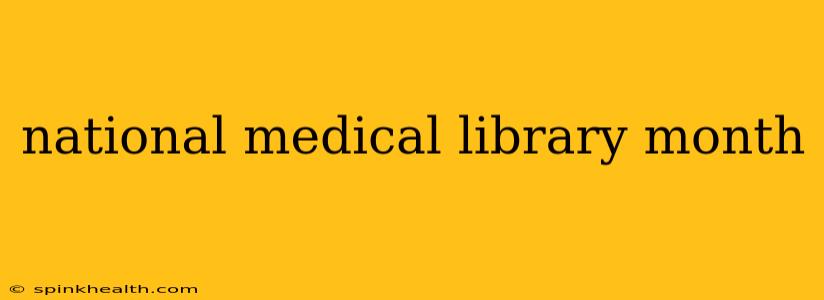October is National Medical Library Month, a time to celebrate the invaluable contributions of medical libraries and the vital role they play in advancing healthcare. It's more than just rows of books; it's a dynamic hub of information, research, and innovation, driving progress in medicine and improving lives worldwide. This isn't just about dusty tomes; it’s a story of tireless dedication to knowledge, a relentless pursuit of cures, and a commitment to empowering healthcare professionals and the public alike. Let's delve into this fascinating world.
What is National Medical Library Month?
National Medical Library Month is an annual observance dedicated to raising awareness about the significance of medical libraries and their essential services. It's a chance to acknowledge the hardworking librarians, researchers, and staff who tirelessly work behind the scenes, ensuring access to crucial medical information for healthcare providers, researchers, students, and the public. This month isn't simply about celebrating the past; it's about looking forward and recognizing the evolving role of medical libraries in our increasingly digital world.
What are the major roles of a medical library?
Medical libraries are far more than repositories of books and journals. They act as central hubs for medical knowledge, playing a crucial role in:
-
Research and Development: Medical libraries provide access to vast databases of research articles, clinical trials, and other essential resources, fueling medical breakthroughs and advancements. Imagine the countless studies on new treatments and cures, all made accessible through these invaluable resources. It’s the quiet, behind-the-scenes engine driving medical innovation.
-
Education and Training: Medical students, doctors, nurses, and other healthcare professionals rely heavily on medical libraries for their education and professional development. They're not just learning about diseases; they're learning how to treat them effectively and compassionately, empowered by the knowledge readily available.
-
Public Health Information: Medical libraries often play a crucial role in disseminating accurate health information to the public, combatting misinformation and promoting health literacy. In an age of instant information, their role in filtering fact from fiction is more important than ever.
-
Supporting Healthcare Professionals: Beyond students, practicing doctors and nurses use medical libraries to stay up-to-date on the latest research, treatment protocols, and medical advancements, ensuring patients receive the best possible care.
How do medical libraries support medical research?
Medical libraries are indispensable to medical research. They provide researchers with access to a wealth of resources, including:
-
Comprehensive databases: PubMed, MEDLINE, and other specialized databases house millions of research articles, allowing researchers to find relevant studies quickly and efficiently. This streamlined access accelerates the research process, leading to faster discoveries.
-
Specialized literature: Medical libraries often possess unique collections of books, journals, and other materials that may not be available elsewhere. This ensures that researchers have access to the full spectrum of knowledge relevant to their work.
-
Expert support: Librarians are trained in information retrieval and can help researchers navigate complex databases and identify relevant literature, saving researchers valuable time and effort. Think of them as highly skilled research navigators.
What services do medical libraries provide?
The services offered by medical libraries extend far beyond simply lending books. They offer a range of vital services, including:
-
Access to online databases: Providing access to subscription-based databases containing millions of scholarly articles, clinical trials, and other medical information.
-
Literature searching and research assistance: Librarians provide personalized assistance with research, helping users to identify relevant literature, conduct systematic reviews, and manage their research projects.
-
Instruction and training: Libraries offer workshops and training sessions on how to effectively utilize medical databases and research tools.
-
Interlibrary loan services: They facilitate borrowing of materials from other libraries across the globe, ensuring access to even the most obscure resources.
-
Digital resources and repositories: Many libraries now offer digital access to their collections, including e-books, e-journals, and other digital resources.
How can I access resources from a medical library?
Accessing medical library resources can vary depending on your affiliation. Students and healthcare professionals often gain access through their institutions. Many libraries also offer public access to some databases and resources, although full access might require membership or a fee. Contact your local medical library or university library for more information on accessing their resources.
This National Medical Library Month, let's take a moment to appreciate the incredible work of medical libraries and the significant impact they have on healthcare around the world. Their contribution is far-reaching, silently driving advancements in medical science and ultimately, improving the lives of countless individuals. It's a story worth celebrating.

